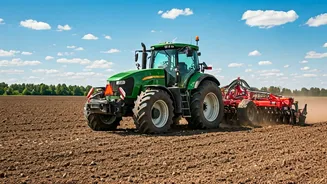Decentralization's Importance Explored
Decentralization within the agricultural framework is presented as a vital component for India’s progress, according to S Mahendra Dev, the chairman of
the Economic Advisory Council to the Prime Minister (EAC-PM). He underscored the need to move away from centralized models, indicating their limitations in addressing the diverse and localized needs of farmers across the country. Such a shift is anticipated to foster greater autonomy, enabling local communities to make informed decisions that resonate with their particular agricultural challenges. This emphasis on localized control is seen as pivotal for enhancing the efficacy of agricultural strategies and ensuring their alignment with the realities on the ground, thereby boosting productivity and sustainability in the sector. Furthermore, a decentralized approach is projected to encourage innovation and customization of farming practices, equipping farmers with the tools and strategies that are best suited to their individual circumstances. This shift promises a more responsive and adaptable agricultural system, capable of withstanding various challenges.
Technology's Transformative Role
The integration of technology into India’s agricultural sector is another critical area highlighted by S Mahendra Dev. He advocated for a strategic deployment of digital tools to enhance various facets of farming, including production, distribution, and market access. Such technological implementations are viewed as catalysts for transforming the sector, by providing farmers with valuable data and resources, empowering them to make better decisions. For instance, precision farming technologies, like GPS-guided machinery and sensor-based monitoring systems, can optimize the use of resources such as water and fertilizers, leading to greater efficiency and lower environmental impact. Moreover, digital platforms can play a key role in connecting farmers to markets more effectively, eliminating intermediaries and ensuring fair prices for their produce. By providing easy access to vital information on weather patterns, crop prices, and best practices, technology can improve the resilience of farming operations and enable a more informed and adaptive approach to agriculture. Consequently, this leads to higher yields, better incomes, and a more sustainable agricultural system.
Empowering Farmers Through Tech
The objective of implementing digital tools extends beyond mere efficiency improvements; it includes a strong emphasis on empowering India's farmers. S Mahendra Dev noted the importance of providing farmers with the necessary knowledge and resources to successfully adopt and benefit from technological advancements. This approach focuses on training and digital literacy programs, aimed at bridging the technology gap and ensuring inclusivity. The idea is to equip farmers, especially those in rural areas, with the skills needed to use digital tools effectively, which could transform them from passive recipients to active participants in the agricultural value chain. This empowerment leads to enhanced decision-making capabilities, opening up new opportunities for growth and increased profits. By enhancing their abilities to handle technological tools, farmers gain greater control over their operations. Digital literacy initiatives are seen as critical to preventing a digital divide, ensuring that all farmers, irrespective of their backgrounds, can fully reap the benefits of technology in agriculture, which ultimately contributes to a more equitable and prosperous agricultural system.
Sustainable Agricultural Growth
A core objective of the recommended changes is to promote sustainable growth within India’s agricultural sector. S Mahendra Dev's vision includes the adoption of practices that minimize environmental impact and preserve resources for future generations. This entails promoting precision farming techniques, which minimize the use of water, fertilizers, and pesticides, thereby reducing pollution and conserving the land. Another crucial aspect is the implementation of climate-smart agricultural strategies, such as drought-resistant crops and water management systems. Such initiatives can help farmers adapt to changing climate patterns and ensure continued productivity. The emphasis on sustainability also includes supporting eco-friendly farming practices and encouraging the utilization of renewable energy sources. This approach intends to build an agricultural system that is resilient, environmentally responsible, and capable of enduring the challenges of a changing world, thus securing the future of Indian agriculture.
Challenges and Opportunities
While the benefits of decentralization and technology integration are substantial, S Mahendra Dev also acknowledges the challenges that must be addressed to ensure their successful implementation. One of the main hurdles is the digital divide, especially in rural areas, where limited internet access and digital literacy hamper the widespread adoption of technology. Addressing these gaps requires strategic investments in infrastructure, along with well-designed educational programs. Other challenges include data privacy concerns, the need for robust cybersecurity measures, and the potential displacement of workers due to automation. However, these challenges are outweighed by opportunities. By proactively addressing these issues, the government can create an environment conducive to technological advancement. Moreover, a decentralized framework offers opportunities for more targeted support and interventions. This tailored approach allows for the tailoring of solutions to meet the specific needs of diverse farming communities across India. The successful navigation of these challenges is vital for realizing the full potential of these strategies.












